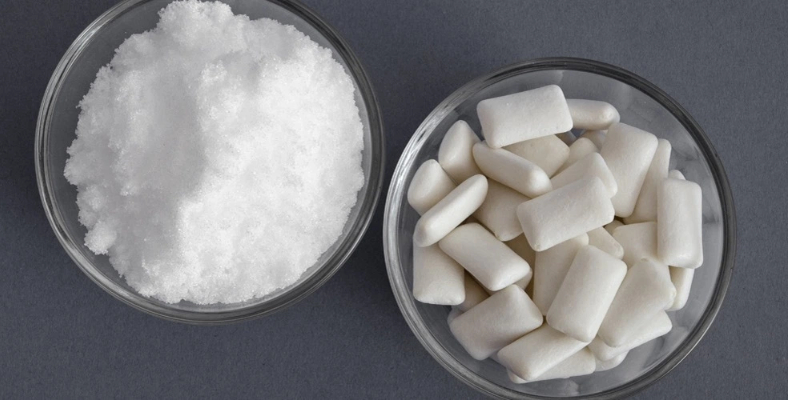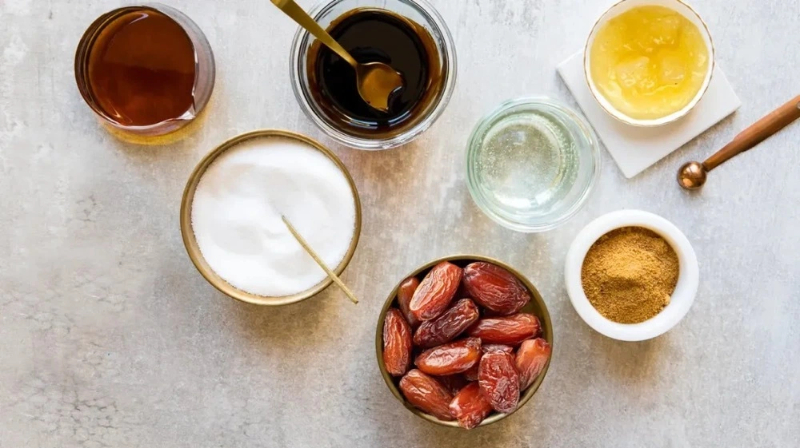Views: 222 Author: Sara Publish Time: 2025-10-16 Origin: Site








Content Menu
● Understanding Sweeteners and Their Role in Diabetes
● Natural Sweeteners Suitable for Diabetes
● Artificial Sweeteners and Diabetes
● Sugar Alcohols (Polyols) in Diabetes
● Health Considerations and Using Sweeteners Wisely
● The Impact of Sweeteners on Blood Sugar
● Innovations and Trends in Sweeteners for Diabetes
● FAQ
>> 1. What is the safest sweetener for people with diabetes?
>> 2. Are artificial sweeteners harmful to people with diabetes?
>> 3. Can I use sugar alcohols if I have diabetes?
>> 4. Is agave syrup a good choice for diabetes?
>> 5. Can sweeteners help manage diabetes long-term?
Managing diabetes effectively requires attention to what goes into the body, especially foods and substances that affect blood sugar levels. Sweeteners, widely used to add flavor without excessive calories, play a critical role for people with diabetes seeking to satisfy their sweet cravings while controlling blood glucose. This comprehensive article delves into the variety of sweeteners available—natural and artificial—examines their effects on blood sugar, safety profiles, and suitability for diabetic diets. It will also provide evidence-based recommendations and practical guidance on using sweeteners responsibly.

Sweeteners are substances added to foods and beverages to provide sweetness. They come in several forms, broadly categorized into nutritive (caloric) sweeteners and non-nutritive (low- or zero-calorie) sweeteners.
- Nutritive sweeteners include common sugars like glucose, fructose, sucrose, and sugar alcohols (also called polyols) such as erythritol, maltitol, and sorbitol. These sweeteners provide energy in the form of calories and carbohydrates, which can affect blood sugar levels to varying degrees depending on their chemical nature and the amount consumed.
- Non-nutritive sweeteners, often referred to as artificial sweeteners, provide sweetness without significant calories or carbohydrates. They include aspartame, sucralose, saccharin, acesulfame potassium, and naturally derived ones like stevia. Because they have little to no impact on blood glucose, they are popular choices for people managing diabetes.
Understanding how each sweetener type influences blood sugar and overall health is vital for choosing the right sweetener.
Natural sweeteners often come from plants and are frequently preferred by health-conscious consumers seeking fewer synthetic additives.
- Stevia extracts from the leaves of the Stevia rebaudiana plant have zero calories and a negligible effect on blood sugar. The sweet compounds, known as steviol glycosides, do not raise blood glucose or insulin levels, making stevia an excellent choice for diabetics. It is widely available in powdered, liquid, and granulated forms. Some report a bitter aftertaste, and excessive consumption might sometimes cause gastrointestinal discomfort.
- Monk Fruit Sweetener (Luo Han Guo) is derived from a small green fruit native to Asia. Monk fruit sweetener contains zero calories, does not raise blood sugar, and is heat-stable, making it suitable for cooking and baking. Its natural sweetness and safety profile have made it popular among diabetic-friendly products.
- Allulose is a rare sugar naturally found in small amounts in fruits like figs and jackfruit. It has about 70% of the sweetness of sucrose but provides minimal calories and does not increase blood sugar or insulin levels significantly. Its properties make it an attractive sweetener for diabetes, especially for those who enjoy baked goods.
- Tagatose, another low-calorie natural sugar, behaves similarly by exerting little influence on blood glucose and insulin but is less commonly found and often more expensive.
Natural sweeteners blend the advantage of plant origins with compatibility for blood sugar management, but personal preferences and tolerances vary.
Artificial sweeteners offer intense sweetness with negligible calories, making them ubiquitous in sugar-free and diet products. They are generally recognized as safe by the FDA when consumed within established acceptable daily intake levels.
- Sucralose (common brand name Splenda) is about 600 times sweeter than sugar, heat-stable, and widely used in cooking and baking. Despite its safety approval, some studies suggest the need for more research on the long-term metabolic effects, but it remains a staple for sugar replacement among diabetics.
- Aspartame is used broadly in diet sodas and tabletop sweeteners. It is not heat-stable, limiting its use in cooked products. It provides sweetness without calories and does not increase blood glucose.
- Saccharin, one of the oldest artificial sweeteners, also has zero calories. While once linked to health concerns, modern research has shown it to be safe for human consumption.
- Acesulfame potassium (Ace-K) is often combined with other sweeteners to enhance sweetness and is approved for numerous food and beverage applications.
Artificial sweeteners allow flavor enhancement without raising blood sugar but must be used within recommended limits.

Polyols, such as erythritol, maltitol, sorbitol, and xylitol, are sugar alcohols found naturally in various fruits and vegetables or synthesized industrially. They provide fewer calories than sugars and have a reduced impact on blood glucose because they are absorbed and metabolized differently.
- Erythritol has almost zero calories, does not raise blood sugar or insulin, and is absorbed rapidly from the small intestine and excreted unchanged in urine.
- Maltitol and sorbitol provide more calories than erythritol and may cause less blood sugar elevation than regular sugar but can still increase blood glucose to some extent.
- Polyols can cause digestive discomfort such as gas, bloating, or laxative effects if consumed excessively, so moderation is important.
Polyols strike a middle ground between caloric sugars and artificial sweeteners, with benefits and limitations in diabetes management.
Despite the advantages of sweeteners for people with diabetes, mindful consumption is crucial. Excessive intake of any sweetener may carry side effects or health risks. Understanding the following points can optimize sweetener use:
- Check Heat Stability: Some sweeteners (like stevia, sucralose, and monk fruit) are heat-stable and suitable for cooking and baking, while others (aspartame) degrade when heated and are best used in cold applications.
- Taste and Palatability: Sweetener flavors vary. Some (stevia, saccharin) have bitter or metallic aftertastes; blending with other sweeteners or flavors can improve acceptance.
- Digestive Tolerance: Be cautious of sugar alcohols, which can cause gastrointestinal symptoms if overconsumed.
- Nutritional Labels: Always review total carbohydrates, as some products labeled "sugar-free" might contain digestible carbs or calories.
- Individual Health Status: Sweetener choice may differ based on personal health, medications, and preferences—consult healthcare professionals accordingly.
- Moderation and Balance: Sweeteners should be part of an overall healthy diet rich in whole foods, fiber, and controlled carbohydrate intake.
No sweetener fully replaces the need for thoughtful nutrition and lifestyle in diabetes care.
The glycemic index (GI) measures how quickly foods raise blood glucose. Most natural and artificial sweeteners have low or near-zero GI values, meaning they do not cause rapid glucose spikes. This makes them valuable tools for glycemic control.
For example, pure glucose has a GI of about 100. Stevia, sucralose, erythritol, and monk fruit sweeteners typically have a GI of zero, indicating negligible blood sugar impact. Sugar alcohols have low GI values, often between 0 and 35, depending on the specific compound.
However, sweeteners may have indirect effects on appetite and insulin sensitivity, so their use must integrate into an overall healthy lifestyle.
Ongoing research focuses on novel natural sweeteners and blends that optimize taste, safety, and metabolic effects. Some exciting areas include:
- Blended Sweeteners: Combining sweeteners like stevia with erythritol can improve taste and reduce side effects.
- Prebiotic Sweeteners: Some polyols also act as prebiotics, supporting gut health, which could benefit metabolism.
- Novel Plant-Derived Compounds: Extracts from new plants with sweetening properties are under study for safety and efficacy.
Technological advances in manufacturing and formulation aim to provide diabetics with delicious, safe sweetening options without compromising health.
For people with diabetes, selecting suitable sweeteners is a critical part of controlling blood glucose while maintaining diet satisfaction. Natural options such as stevia, monk fruit, allulose, and tagatose offer zero or low-calorie sweetness with minimal glycemic impact. Artificial sweeteners—including sucralose, aspartame, saccharin, and Ace-K—provide effective sugar alternatives in many products. Polyols like erythritol and maltitol bridge the gap with fewer calories and lowered blood sugar effects but require moderation.
The key to successfully using sweeteners lies in informed choice, moderation, and integrating them into a balanced diet rich in fiber, whole grains, and nutrient-dense foods. People with diabetes should consult healthcare providers to tailor sweetener use individually, considering taste preferences and any medical conditions.
With the expanding variety of sweeteners and ongoing research, people managing diabetes can enjoy sweetness safely while supporting long-term health goals.

Stevia and monk fruit sweeteners are widely regarded as safe and effective because they are natural, contain no calories, and do not raise blood glucose levels. Personal tolerance should be considered.
FDA-approved artificial sweeteners are safe when consumed within recommended limits. While studies continue on long-term effects, current evidence supports their use as part of diabetes management.
Yes, sugar alcohols like erythritol have minimal impact on blood sugar but can cause digestive issues if taken in excess. They offer a low-calorie alternative to sugar.
No, agave syrup is high in fructose, which can negatively affect blood sugar and insulin sensitivity despite being natural.
Sweeteners help reduce calorie and carbohydrate intake but do not replace overall dietary strategies. They support blood sugar control when combined with holistic diet and lifestyle approaches.
Top Nutritional Supplement Manufacturers And Suppliers in Indonesia
Top Nutritional Supplement Manufacturers And Suppliers in India
Top Nutritional Supplement Manufacturers And Suppliers in Germany
Top Nutritional Supplement Manufacturers And Suppliers in France
Top Nutritional Supplement Manufacturers And Suppliers in Canada
